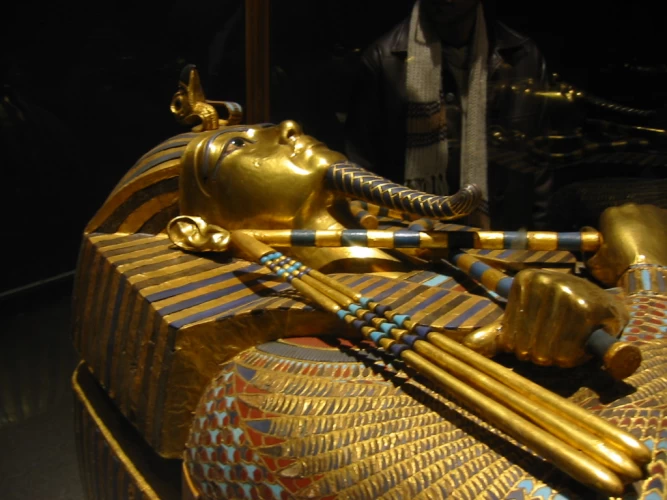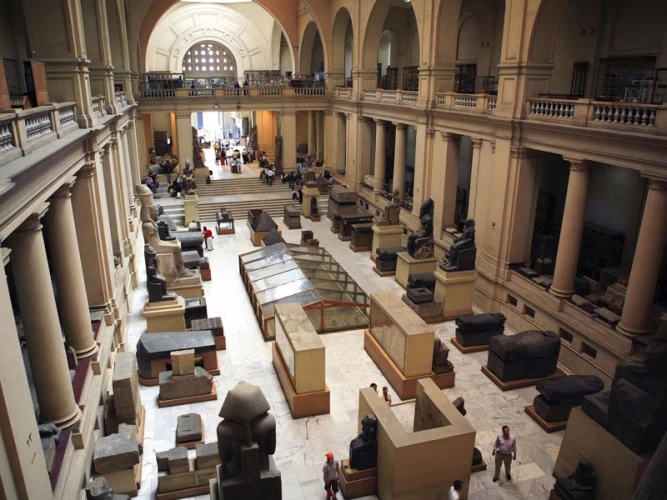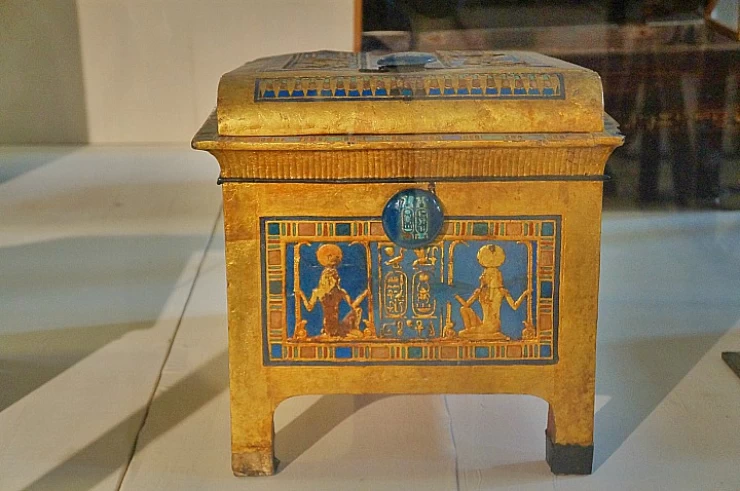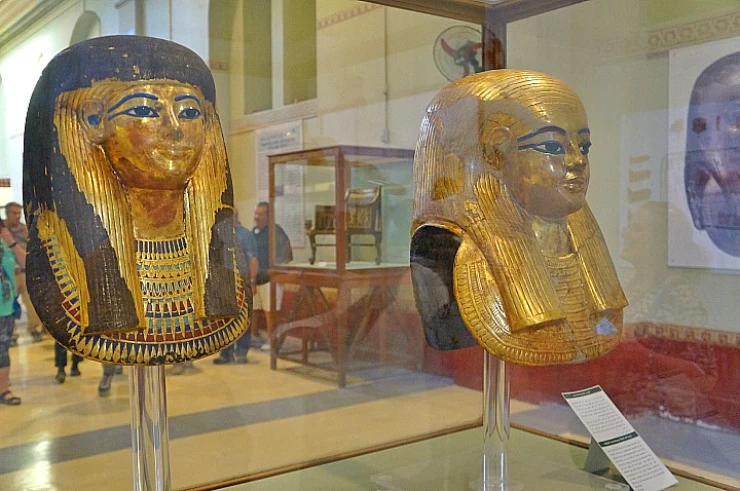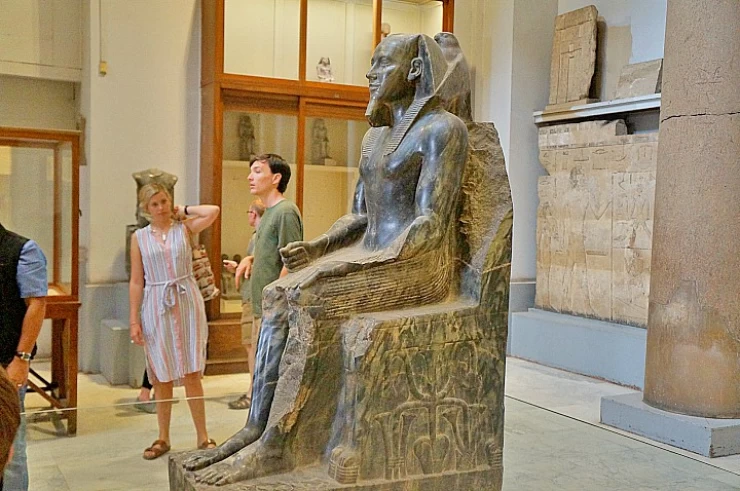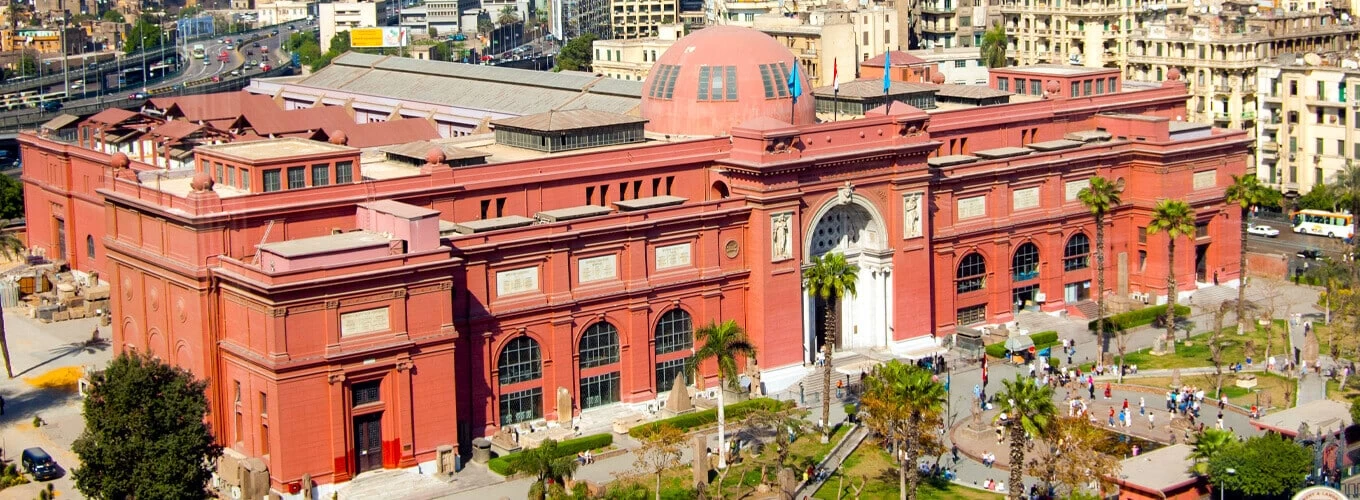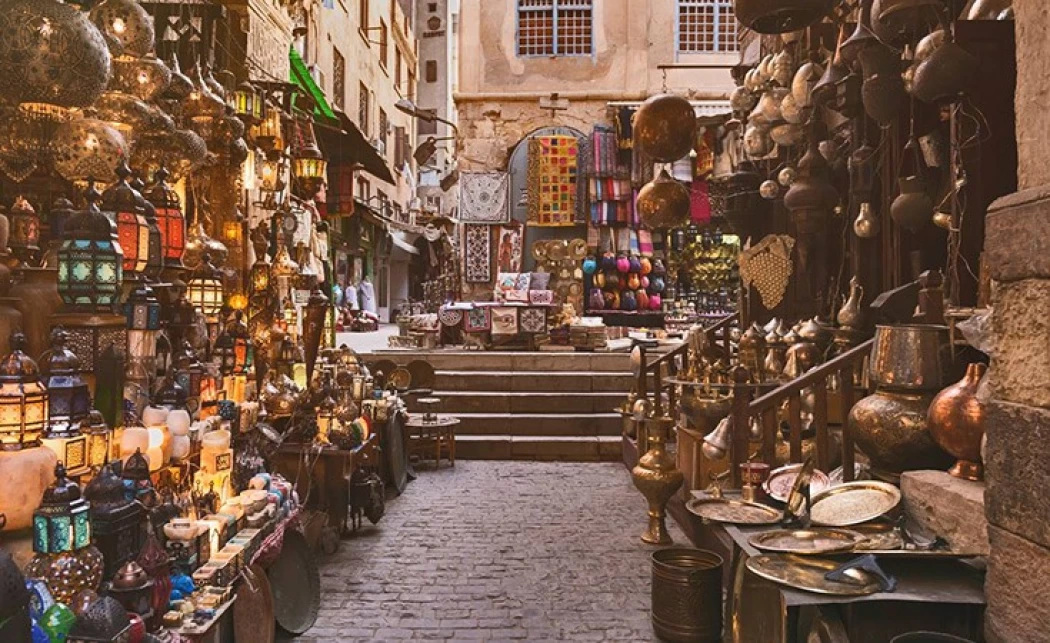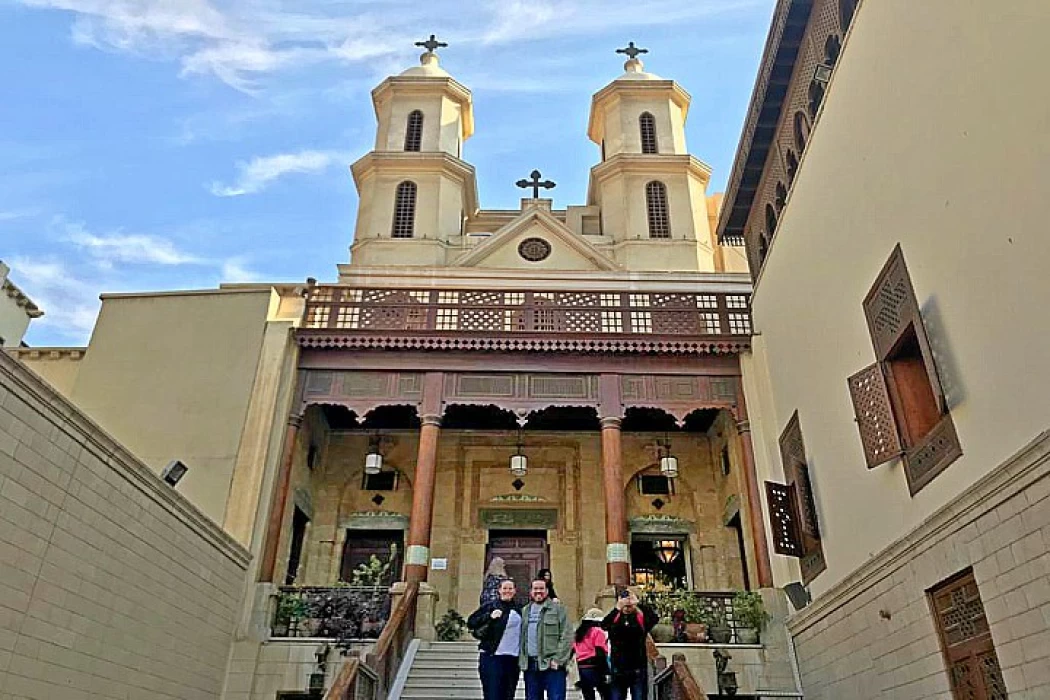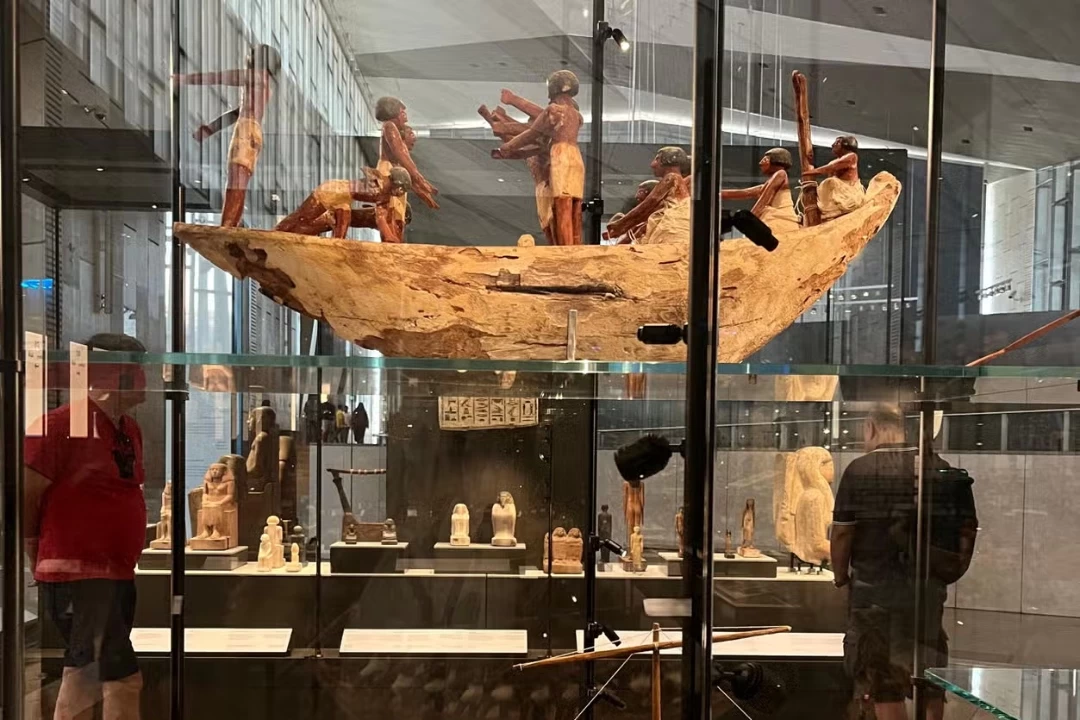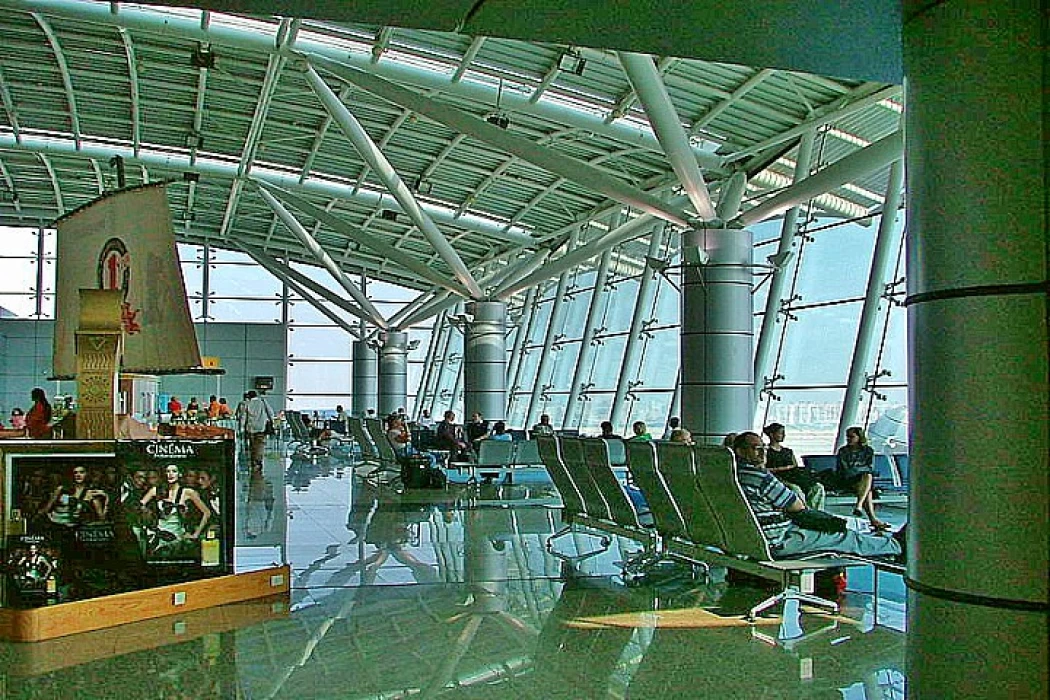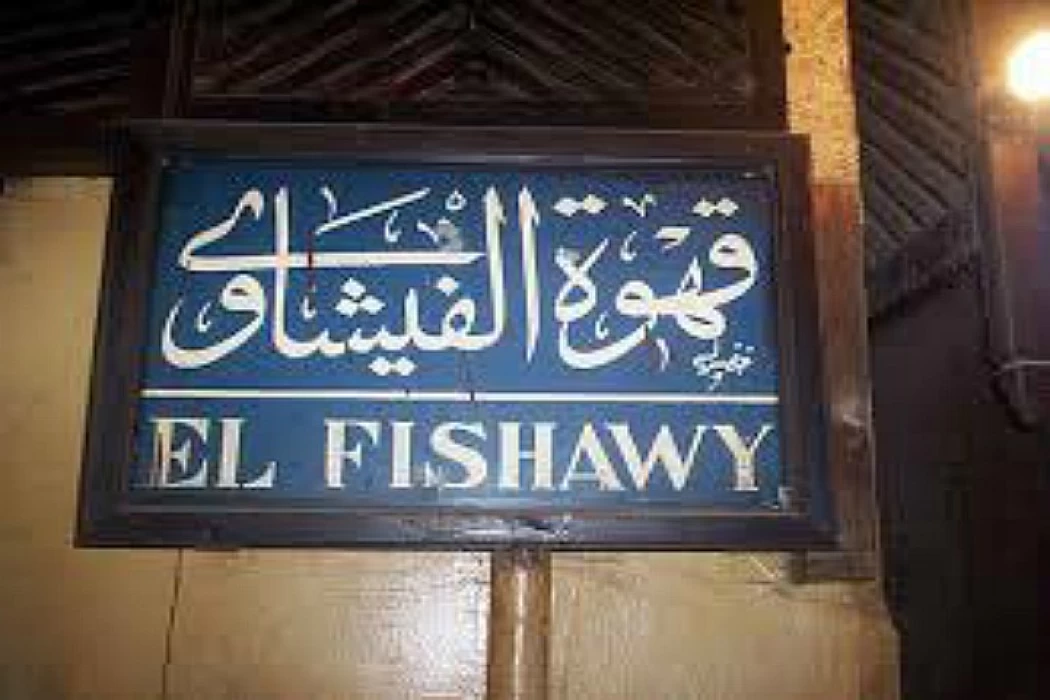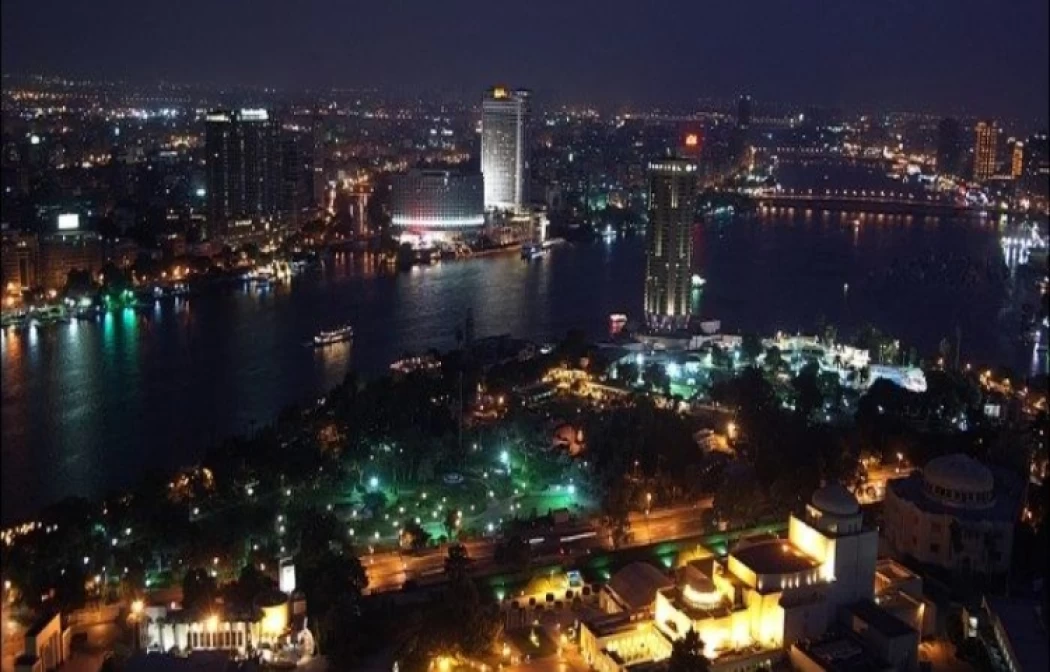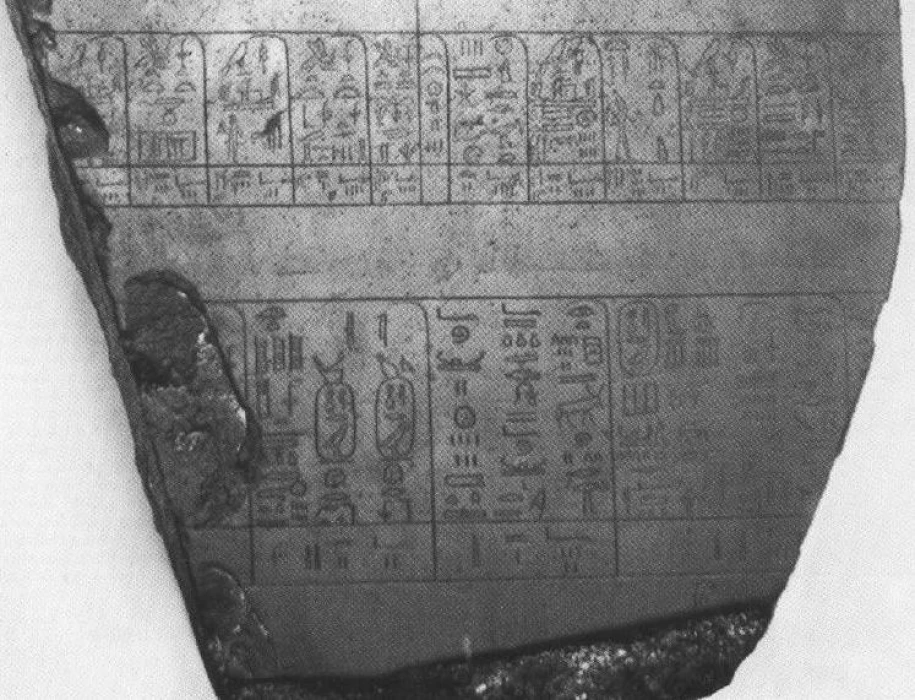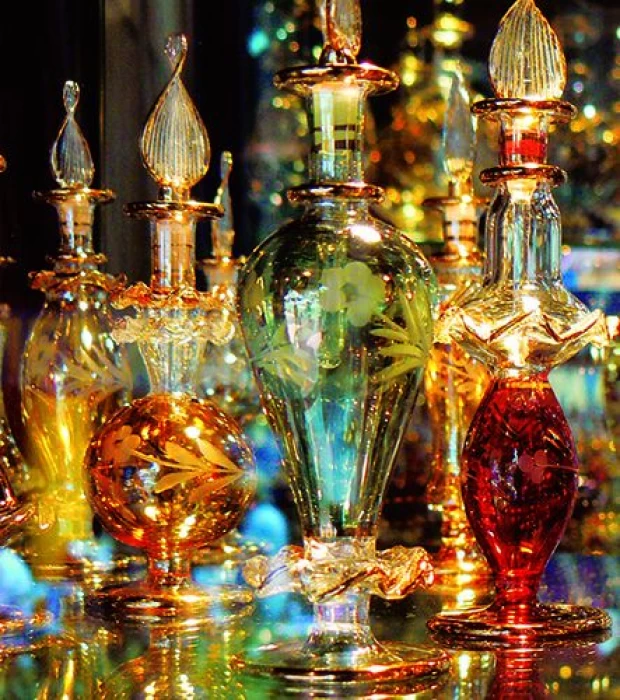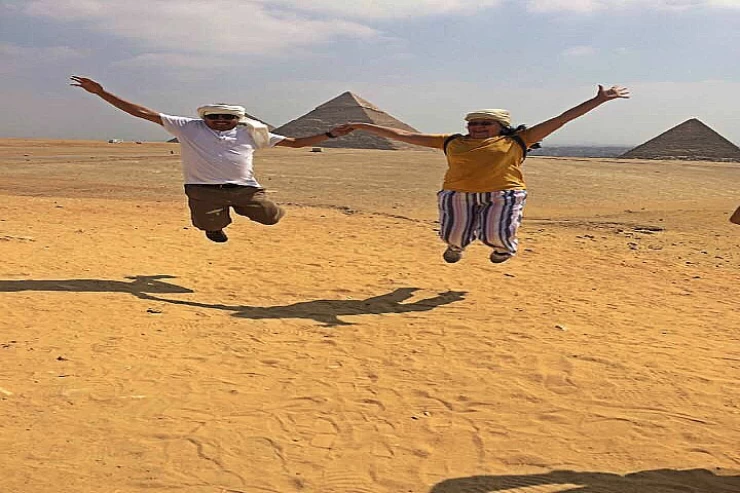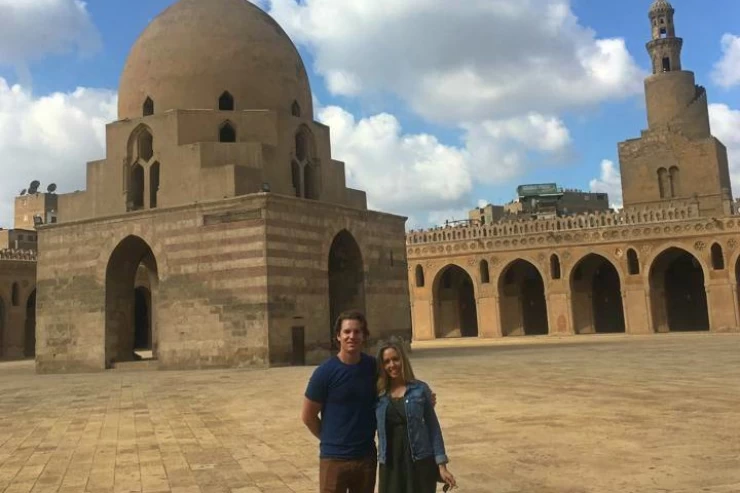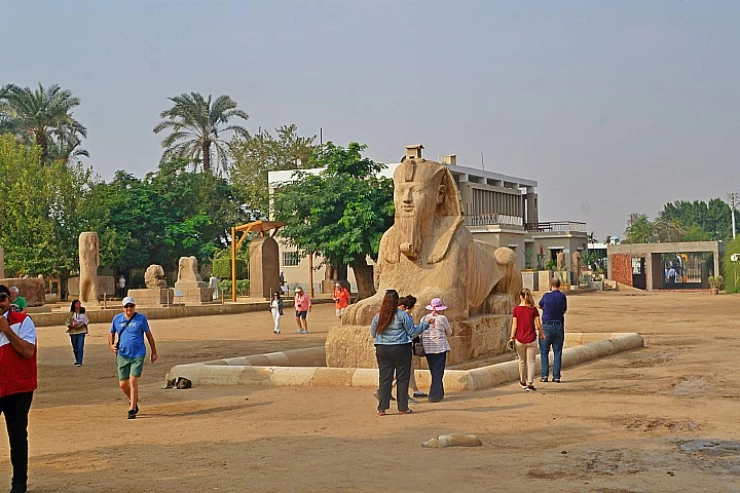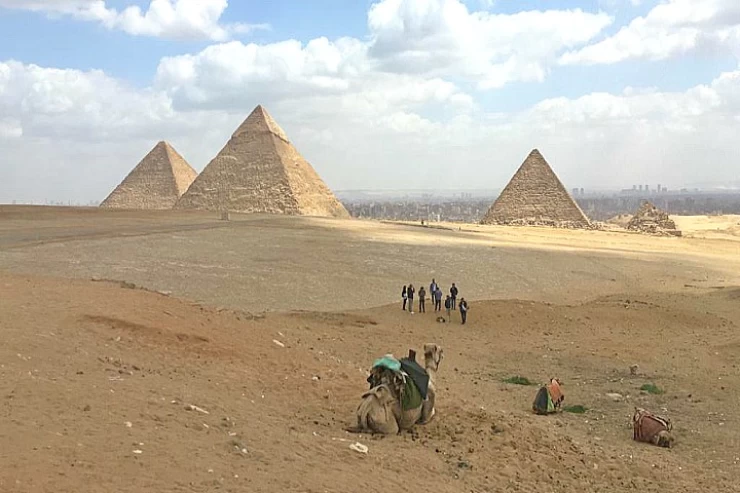Half-Day Tour to the Egyptian Museum
Overview
Half-Day Tour to Egyptian Museum
The Egyptian Museum is tucked away amid the most famous and largest museums in the world. Along with us, you will tour the museum and depart Egypt with a plethora of memories. It holds the greatest collection of antiquities in the world, showcasing every phase of ancient Egyptian history.
Inside the museum are about 120,000 artifacts. Your route to discovering all the mysteries you must discover is through the tour of the Egyptian Museum. Acquire the King Tutankhamun mask among many other items.
you can see lots of interesting things from a long time ago it is The Egyptian Museum In Cairo is a special place in Egypt. It has ancient artifacts like statues, jewelry, and even mummies! It's like a big treasure chest full of history and you can learn all about the people who lived in Egypt a very long time ago.
Looking for something fun to do in Cairo? Check out our Cairo day tours! We offer a variety of tours that will suit your interests, whether you're looking to explore the Giza pyramids or experience the city's vibrant nightlife.
Half-Day Tour to Egyptian Museum
The Egyptian Museum is tucked away amid the most famous and largest museums in the world. Along with us, you will tour the museum and depart Egypt with a plethora of memories. It holds the greatest collection of antiquities in the world, showcasing every phase of ancient Egyptian history.
Inside the museum are about 120,000 artifacts. Your route to discovering all the mysteries you must discover is through the tour of the Egyptian Museum. Acquire the King Tutankhamun mask among many other items.
you can see lots of interesting things from a long time ago it is The Egyptian Museum In Cairo is a special place in Egypt. It has ancient artifacts like statues, jewelry, and even mummies! It's like a big treasure chest full of history and you can learn all about the people who lived in Egypt a very long time ago.
Looking for something fun to do in Cairo? Check out our Cairo day tours! We offer a variety of tours that will suit your interests, whether you're looking to explore the Giza pyramids or experience the city's vibrant nightlife.
Inclusion
Pick-up services from your hotel in Cairo or Giza.
Transports by an exclusive air-conditioned vehicle through your tours in Cairo.
Admission fees to the mentioned sites.
English-speaking certified tour guide.
Bottled water during our Cairo day tours.
Shopping tours in Cairo. (Upon Request).
All taxes and service charges of Egypt Day Tours are covered.
Exclusion
Any extras that are not specified in the tour itinerary.
Tipping is not included in the price of our Cairo Trips.
Prices are valid during Christmas and New Year tours in Egypt or Egypt Easter tours.
Itinerary
Be ready to meet our highly qualified Egyptologist guide who will be at your service the whole day tour from Cairo, and then he will guide you from your hotel through this Half Day Tour to Egyptian Museum to see the richness of the Egyptian Museum, which is a building of 2 floors and has a very exceptional collection of ancient Egyptian art and statues that include most of the eras of the Egyptian history starting from the first dynasty when King Narmer, who is also known as Menes, unified the two lands, passing through the third dynasty of the great King Djoser who is the owner of the Step Pyramid in Saqqara, the fourth dynasty during the Old Kingdom that was established by the powerful King Snefru whose sons and grandsons built the Giza pyramids.
And all the masterpieces of the Middle Kingdom and the New Kingdom or the golden era of Egypt. Over 6000 years ago. 250,000 masterpieces are exhibited in the showcases and a lot more in the stores. It means if you would like to spend 1 minute in front of each statue, you will need above 6 months, including the treasures of Tutankhamen who belong to the eighteenth dynasty, a vast collection of gold artifacts and silverware as well as jewelry, treasure chests, military chariots, perfume containers, chairs, and gilded funeral coffins were buried under the sand over 3500 years till the tomb was excavated in 1922 revealing such beautiful items of the golden Pharoah, then it was completely moved to Cairo and the Egyptian government has displayed it all in the second floor of the Egyptian museum, along with the collection of Yuya and Thuya, parents of King Amenhotep III and grandparents of the child King Tutankhamen.
Then you will be transferred back to your hotel after we completed the Egyptian Museum Cairo Trip.
Price
| Number of Persons | Prices |
|---|---|
| 1 Person | $120 Per Person |
| 2 - 3 Persons | $75 Per Person |
| 4 - 6 Persons | $60 Per Person |
| 7 - 10 Persons | $50 Per Person |
Quick tips
Start from : 50
Check Availability
Related Articles


You Also May Like
Looking for something different? check out our related tour now, or simply contact us to tailor made your Egypt tour
Tour to Giza Pyramids and Egyptian Museum in Cairo
Don't miss the chance to be among the initial visitors to discover the concealed passageway within the Great Pyramid of Giza. Witness the marvels of the world, including the sphinx and the three pyramids. Additionally, you can observe the remarkable pharaonic artifacts at the Egyptian Museum during the day trip in Cairo.
Tour to the Egyptian Museum, Old Coptic and Islamic Cairo
Discover the significance of Egypt's city by visiting the Egyptian Museum and admiring its impressive exhibits. You can also visit the renowned landmarks and churches of Coptic Cairo that once housed the holy family and its unique icons. Furthermore, enjoy exploring the historic mosques of Islamic Cairo during your trip to old Cairo.
Cairo Excursions to Giza pyramids, Sakkara and Memphis
Embark on an extraordinary tour to witness the iconic pyramids of Giza and behold the magnificence of Egyptian pharaohs. Explore the ancient capital of Egypt, adorned with a plethora of pyramids and tombs, and unveil the concealed mysteries during your Cairo excursion.
Cairo Stopover Transit Tour | Cairo Layover Tour during the break
What about new experiences traveling through the ages? We will start by exploring the great pyramids and watching the great art of architecture, you will also discover the exceptional collection of artifacts of the Egyptian Museum. Another atmosphere, that you will enjoy during your tour in Khan El Khalili.
Egypt Trips and Middle East Reviews
Egypt Tours has gained a lot of positive reviews from travelers who praise cheap Egypt tours as reflected in our social media accounts, TripAdvisor reviews, and YouTube videos. Customers love traveling through Egypt with expert guides who remain with them throughout their journey, vividly enlivening each site they visit, from Egypt to the Holy Land.
Egypt Tours is now bombarded with glowing comments and praises from travelers who appreciate our economical tours as seen for themselves on our social media pages, TripAdvisor reviews, and YouTube videos. Traveling through Egypt is just perfect for guests who are accompanied by our expert guides bringing history alive at each site visited by the tourist throughout the journey to the Holy Land.
As you can see from our social media accounts, Trip Advisor, and YouTube videos, Egypt Tours has received a lot of positive feedback from customers who love their low-cost tours of Egypt with our experts who accompany them everywhere in Egypt to show them the history of each site they visit during their tours of Egypt and the Holy Land. As you can see from our social media accounts, and YouTube videos, Egypt Day Tour has received a lot of positive feedback from customers who love their low-cost tours of Egypt with our experts who accompany them everywhere in Egypt to show them the history of each site they visit during their tours of Egypt and the Holy Land.
Egypt Tours FAQ
Read top Egypt tours FAQs
Egypt is an important country with lots of amazing places to visit. If you want to see all the coolest stuff like the Egyptian Museum, it's a great idea to join a guided day tour. This way, you won't miss any of the most interesting things this country has to offer.
To learn about the history and ancient artifacts of Egypt, you can explore a combination of museums, historical sites, books, documentaries, and online resources. Here are some steps and resources to help you delve into Egypt's rich history and heritage:
Visit museums and historical sites:
The Egyptian Museum (Egyptian Museum of Antiquities) in Cairo is a must-visit. It houses an extensive collection of ancient Egyptian artifacts, including the treasures of Tutankhamun.
Visit historical sites like the Giza Pyramids, the Sphinx, Luxor Temple, Karnak Temple, and the Valley of the Kings to see ancient structures and artifacts in their original settings.
Guided Tours: Consider taking guided tours of historical sites and museums in Egypt. Knowledgeable guides can provide in-depth information and context about the artifacts and their historical significance.
Read books and publications:
There are numerous books and publications dedicated to Egypt's history, archaeology, and ancient artifacts. Look for titles written by renowned Egyptologists and historians.
Consider reading books like "The Oxford History of Ancient Egypt" by Ian Shaw or "Temples, Tombs, and Hieroglyphs" by Barbara Mertz (Elizabeth Peters) for comprehensive overviews.
Online Resources:
Explore reputable websites and online resources that offer information about Egyptian history and archaeology. Websites like the website of the Egyptian Ministry of Tourism and Antiquities and the Egypt Exploration Society provide valuable insights.
Utilize academic databases and research articles for more in-depth studies.
Documentaries and Films:
Watch documentaries and films about ancient Egypt. The BBC series "Egypt" and the National Geographic series "Egypt's Greatest Mysteries" are excellent options.
Online Courses and Lectures:
Consider enrolling in online courses related to Egyptology and archaeology. Universities and platforms like Coursera and edX offer such courses.
Look for lectures and talks by Egyptologists and archaeologists that are available online.
Visit Archaeological Sites:
If you have the opportunity, participate in archaeological digs or volunteer at archaeological sites in Egypt. This hands-on experience can provide a unique perspective.
Join online forums and communities:
Engage with online communities, forums, and social media groups dedicated to Egyptology and ancient history. You can ask questions, share knowledge, and learn from enthusiasts and experts.
Language Learning:
Learning some basic Egyptian Arabic or hieroglyphics can enhance your understanding of ancient Egypt and its culture.
Travel and Immerse Yourself: If possible, immerse yourself in the local culture during your visit to Egypt. Interact with locals, attend cultural events, and explore the country beyond the tourist hotspots.
The Egyptian Museum in Giza, also known as the Egyptian Museum of Antiquities or simply the Egyptian Museum (not to be confused with the Grand Egyptian Museum near the Giza Pyramids), is a renowned institution that holds immense significance in the field of archaeology and Egyptology. Its importance lies in the following aspects:
Historical Significance: The Egyptian Museum is one of the world's oldest and most comprehensive museums dedicated to the preservation and display of ancient Egyptian artifacts. It was established in 1835, making it one of the earliest museums of its kind.
Artifact Collection: The museum boasts an unparalleled collection of artifacts from ancient Egypt, spanning over 5,000 years of history. Its holdings include a vast array of items, such as statues, jewelry, mummies, papyrus scrolls, pottery, and monumental sculptures.
Tutankhamun's Treasures: One of the museum's most famous exhibits is the extensive collection of treasures from the tomb of Pharaoh Tutankhamun. These artifacts, including the iconic golden mask of Tutankhamun, provide a glimpse into the opulence and craftsmanship of the New Kingdom period.
Educational Resource: The Egyptian Museum serves as a vital educational resource for scholars, researchers, and students in the fields of archaeology, Egyptology, and ancient history. Its diverse collection offers valuable insights into the culture, religion, and daily life of ancient Egyptians.
Preservation of Heritage: The museum plays a crucial role in preserving Egypt's cultural heritage by safeguarding and conserving thousands of artifacts. It helps protect these treasures from theft, damage, and deterioration.
Tourist Attraction: As a major tourist attraction in Cairo, the museum draws visitors from around the world who come to marvel at its collection and learn about Egypt's ancient civilization.
Public Engagement: The Egyptian Museum actively engages the public through exhibitions, lectures, workshops, and educational programs. It promotes understanding and appreciation of Egypt's rich history and culture.
Research and Study: Scholars and researchers have access to the museum's extensive archives and collections for academic study and research purposes.
Cairo's Cultural Heritage: The museum is an integral part of Cairo's cultural landscape and contributes to the city's reputation as a hub of historical and archaeological significance.
Legacy: The Egyptian Museum's legacy extends beyond its walls. It has inspired generations of Egyptologists and archaeologists and continues to influence the study of ancient Egypt.
The Egyptian Museum in Cairo is one of the most popular tourist attractions in Egypt, and the best time to visit can depend on your preferences and priorities. Here are some considerations for choosing the best time to visit:
Early Morning (Opening Time): Visiting the Egyptian Museum early in the morning when it opens is often the best time to avoid crowds and have a more peaceful and enjoyable experience. The museum can get busy later in the day, so being one of the first visitors when it opens can give you a more tranquil and less crowded visit.
Weekdays: Weekdays, especially early in the week (Sunday through Wednesday), tend to be less crowded than weekends. If you can, plan your visit for a weekday to avoid larger crowds.
Off-Peak Season: Egypt has a peak tourist season, typically from late October to early April, when the weather is milder. During this period, the museum can be busier. To avoid the crowds, consider visiting during the shoulder season (late April to early June and late September to early October) or the summer months (though it can be very hot).
Avoiding Public Holidays: On public holidays and during special events, the museum can get exceptionally crowded. Check the Egyptian holiday calendar and try to plan your visit during non-holiday periods.
Late Afternoon: If you prefer a quieter experience but can't make it in the morning, consider visiting in the late afternoon. Many tourists tend to visit earlier in the day, so the museum may be less crowded in the late afternoon.
Guided Tours: Joining a guided tour can help you navigate the museum efficiently and provide you with expert insights into the exhibits. Some guided tours offer skip-the-line access, which can save you time.
Ramadan Considerations: During the Islamic holy month of Ramadan, the museum's hours of operation may be adjusted, and some exhibits or services might be affected. It's advisable to check the schedule and plan accordingly.
Plan Ahead: Regardless of the time you choose to visit, it's a good idea to plan your visit in advance. Know which sections or exhibits you want to see, and consider purchasing your tickets online to save time at the entrance.
Opening hours vary from business to business, but here’s a rough guide: offices will open from 9 a.m. to 6 p.m. or longer from Saturday to Thursday, depending on the type of business. Major banks are open from 9 a.m. to 2:00 p.m. Restaurants tend to stay open until around 12 p.m., while bars and clubs will close during the daytime, with plenty of them operating all night, particularly in popular nightlife hubs.
Popular day tours in Cairo often include visits to the Giza Pyramids, the Egyptian Museum, the Khan el-Khalili market, and other historic sites within the city.
Yes, when visiting archaeological sites in Egypt, there are certain restrictions and guidelines that tourists should be aware of to ensure a respectful and enjoyable experience.
- Respectful Behavior.
- photography and videography.
- Restricted Areas.
- Guided Tours.
- Restricted Items.
- climbing and accessing structures.
- Security Measures.
- Cultural Sensitivity.
The museum's collection includes statues, jewelry, mummies, and other artifacts from ancient Egypt. Highlights include the golden mask of Tutankhamun, the mummy room, and the royal mummy collection.
A Half-Day Tour to the Egyptian Museum is a guided excursion that allows visitors to explore one of the world's most significant museums dedicated to ancient Egyptian artifacts and treasures. The Egyptian Museum, located in Cairo, Egypt, houses an extensive collection of artifacts, including mummies, statues, jewelry, and other archaeological finds from ancient Egypt.
The Egyptian Antiquities Museum and the Luxor Museum now allow non-flash photography, as stated by PerpetualStudent86. You cannot take pictures in the Royal Mummy Rooms or the Tutankhamun Gold Room without a special ticket


Cairo Top Tours Partners
Check out our partners
